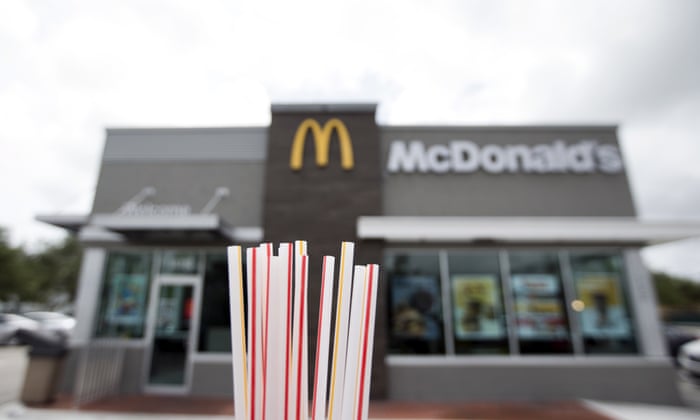Paper straw factory to open in Britain as restaurants ditch plastic
Jun 30, 2018
Production line in Ebbw Vale, Wales, to make straws for McDonald’s and others

No paper straws have been made in Britain for the last several decades. But that is about to change as a group of packaging industry veterans prepare to open a dedicated paper straw production line in Ebbw Vale, Wales, making hundreds of millions of straws a year for McDonald’s and other food companies as they prepare for a ban on plastic straws in the UK.
“We spotted a huge opportunity, and we went for it,” said Mark Varney, sales and marketing director of the newly created paper straw manufacturer Transcend Packaging. “When the BBC’s Blue Planet II was on the telly and the government started talking about the dangers of plastic straws, we saw a niche in the market.”
Varney and his business partners, all stalwarts of the packaging industry, watched as chains including Costa Coffee, Wetherspoons and Pizza Express announced plans to phase out plastic straws in favour of biodegradable paper.
“It is great that all these businesses are phasing out plastic straws, but the problem for them was where to get paper ones from,” Varney said. “Everyone is having to import them from China, and when you look at the carbon footprint of that it kind of defeats the exercise.”
So Varney and his partners set about opening what they reckon will be the only paper straw production plant in Europe. “We set up this company to give the the customers what they actually want: biodegradable paper straws made in the UK,” he said.
Transcend signed a deal last week to supply straws to 1,361 McDonald’s outlets from September. The deal was agreed before Transcend has made its first straw as the company is waiting on delivery of machines from China. McDonald’s uses 1.8m straws a day in the UK. The Northern Irish factory of the Finnish packaging company Huhtamaki will also supply McDonald’s but is understood to not yet have paper straw production capabilities.
Varney said the McDonald’s deal was just the tip of the iceberg and the company is in talks with several other restaurant groups about supplying straws. “Once a giant brand like McDonald’s says they are switching to paper, I suspect everyone else will follow,” he said.
Paul Pomroy, chief executive of McDonald’s UK and Ireland, said the company’s decision to ditch plastic for paper was driven by its customers who “told us they wanted to see a move on straws but to do so without compromising their overall experience when visiting our restaurant”.
Consumers have launched campaigns including The Last Straw, Straw Wars, Straws Suck and No Straw Please to encourage businesses to reduce use of plastic straws. The campaigns against straws gained momentum following the BBC’s Blue Planet II series which highlighted the danger plastic poses to marine life.
The programme, which was the most watched TV show of 2017, featured a pilot whale calf which is thought to have died after consuming its mother’s milk contaminated with toxic chemicals from plastic. David Attenborough, who narrated the programme said: “Unless the flow of plastics into the world’s oceans is reduced, marine life will be poisoned by them for many centuries to come.”
A 2015 YouTube video of a turtle whose head was impaled by a plastic straw has been watched more than 27m times. A report by the World Economic Forum has estimated that by 2050 there could be more plastic in the ocean than fish.
Paper straws are more expense than plastic, but Varney said the cost is very small compared to the public relations benefit to brands of being able to say they are making a real effort to reduce plastic waste. Plastic straws cost about 10p per thousand, compared to 14-15p for paper alternatives. “McDonald’s, bless them, understood the massive difference to the environment,” Varney said.
Transcend employs 20 people and plans to hire 200 by 2019 when the Ebbw Vale factory will be running at full capacity. “We think we are going to need 20 machines to fulfil what we want to deliver into the marketplace.”
Source: The Guardian News